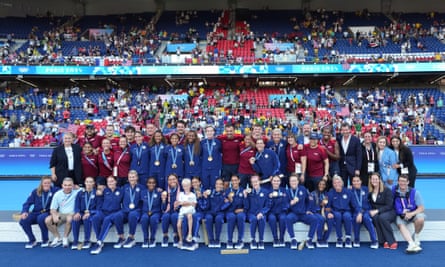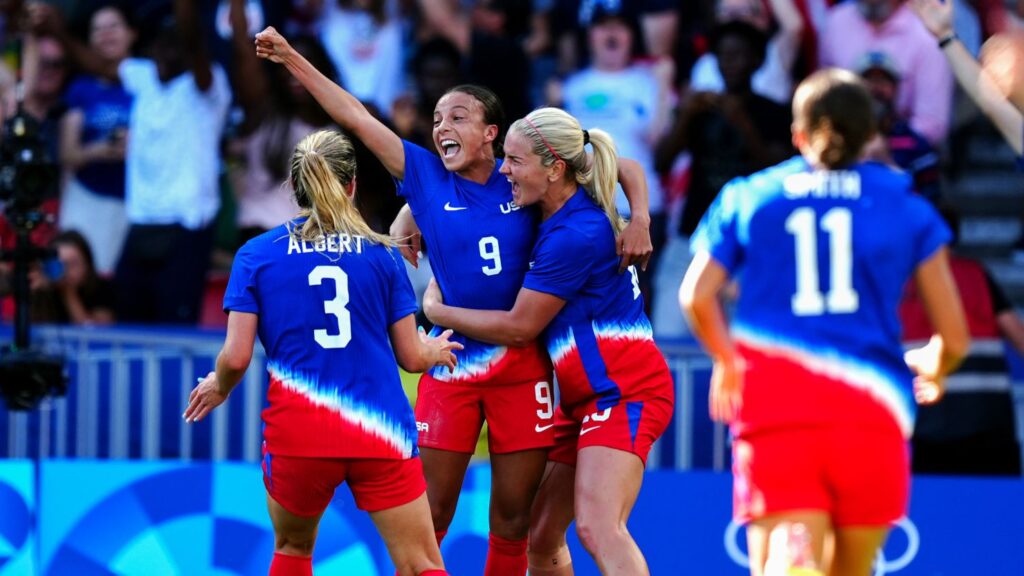Twelve years ago Emma Hayes was sitting next to her father, Sid, at Wembley, watching the USA women’s team win their fourth Olympic gold medal. Hayes – to all intents and purposes unemployed, after she had been sacked by the Chicago Red Stars – leaned across to Sid and, as he recalled it, said: “Dad, you see those 50 people out there? I’ve coached 40 of them.”
It was a poignant moment for Sid, one he remembered in an interview with the Guardian in 2021 as the moment he truly understood just how good a coach she was.
It was unsurprising, then, that Hayes’s late father, who died last September, featured heavily in interviews with the manager around the 2024 Olympic final on Saturday. Hayes was not sitting in the stands watching this time. As the final whistle sounded, standing on the edge of the technical area, she balled her hands into fists, tilted her head back and roared into the air.
Just 81 days after she named her first squad as USA women’s team manager and 76 since her first training session with the side, a 1-0 win against Brazil in the final means Hayes has an Olympic gold medal – figuratively at least, as head coaches do not get given them.
Hayes’s appointment as the USA’s head coach was announced in November, just two months after the death of her father, who she said had given her his blessing when they spoke about whether she should take on the role.
The months that followed as she saw out the domestic season with Chelsea confirmed that without Sid she could not have continued at the club anyway.
“He wasn’t in his seat. I found that almost impossible. I found I almost couldn’t look towards the stand any more,” she told the former USA international Sam Mewis at a live event for the Women’s Game podcast before the Olympics.

There will be sadness amid the celebrations. The England forward Fran Kirby, who spent nine years under Hayes at Chelsea and lost her mother when she was 14, articulated well the force of loss in the most successful of times.
“I struggle the most when things are going well and not everyone understands that,” she said in an interview with the Times shortly after the Lionesses’ European Championship victory. “It’s not because I’m sad, it’s because I want her to be there and celebrate.”
In Paris, Hayes took her moment, turning to the crowd and kissing her dad’s American eagle necklace that hung round her neck.
Hayes knows how to celebrate – despite whatever pain there may be – hard. This is the manager who joked after Chelsea’s Women’s Super League title win in 2023 that you would find her the next day “in north London on a park bench with a bottle of gin”. After the 2024 WSL title win she exited her final Chelsea press conference, beer in hand, saying: “See you guys at some point, maybe at the Olympic gold medal final. I’ve gotta fucking beat the Spanish at some point.”
She would not beat Spain on their run to gold and, after multiple Champions League defeats against Barcelona, that is something she will have to wait a little longer to tick off the to-do list. However, defeats of Japan, Germany and Brazil in the knockout stage, added to victories against Zambia, Germany and Australia in the group stage, demonstrated a remarkable turnaround.
This time last year, USA had unceremoniously crashed out of the World Cup in the last 16, losing 5-4 against Sweden on penalties after a string of dire performances. It was the four‑time champions’ worst finish.
How then, with the air of invincibility well and truly gone, has Hayes turned a confused and changing team, one that was grappling with the investment in and increased competitiveness of European women’s football, into a coherent one in just a couple of months?
The air of invincibility is not back, it probably will not return. The global game is growing too quickly for one team to dominate the way USA have, but with Hayes at the helm none of that really matters because she is, arguably, the best coach in the world.
Speaking to NBC after the final Hayes said restoring their joy in playing was key to their victory. “I come from a place of wanting players to enjoy themselves.”

It is that simple, and yet it is not. Despite seeing out her Chelsea contract the new head coach undoubtedly started to work and make her mark unofficially much sooner. The retirement of Megan Rapinoe and Julie Ertz helped to begin a new chapter, and the phasing out of the 35-year-old Alex Morgan, the 39-year-old Becky Sauerbrunn and the 36-year-old Kelley O’Hara across the last year, legends of the team, showed that Hayes was not afraid to put sentiment aside and act with the long-term future of the team in mind – something she did year‑on‑year at Chelsea.
Focus on individual development, team building and fun – something she pioneered at Chelsea – is being delivered to the impressive array of talent at the disposal of the USA women’s national team. One such example is “positive discomfort”: the idea of being constantly tested and challenged to aid your growth as a player and a person.
Meanwhile, Hayes has continued her practice of looking outside football to deliver messages to her teams. This time, it was a video of the ultramarathon runner Courtney Dauwalter discussing what it takes to dig deep and how she picks at the walls of her “pain cave” during 100‑mile races. She had watched the team deliver twice in extra time to reach the final, but if Dauwalter can run blind through parts of her ultramarathon runs, then the USA team can withstand the heat of France in August, the exhaustion that comes with the small Olympic squad sizes and mental obstacles that pop up when things are not going your way.
Given her pedigree, Hayes was always going to be afforded trust, but this gold has bought her a whole lot more. Now, she can spend time on the technical and tactical aspects as she bids to restore USA to their seat on top at the 2027 Brazil World Cup.








More Stories
Amorim insists Fernandes not leaving Manchester United amid Madrid reports
How debt burden pushed Nigerian boxer Segun Olanrewaju to a fight that took his life
Nigeria Taekwondo Federation boss, Abdullahi Saidu dies at 53